Some Thoughts on NaNoWriMo

Welcome to the Stone Soup Weekly Digest! This is where I share what I'm up to and some of my favorite things from around the internet. Subscribe to Stone Soup to get this in your inbox every week.
Recently, NaNoWriMo – the organization that promotes National Novel Writing Month and sustains the associated online community–published their official statement regarding their position on Artificial Intelligence. The statement, as published at that time, began with the thesis that the organization neither supported nor condemned the use of so-called AI technology in the writing process. The statement then went on to outline NaNoWriMo’s position that condemnation of AI-generated writing was classist and ableist; that lots of people liked AI and that them liking it mattered; and that people could do what they wanted.
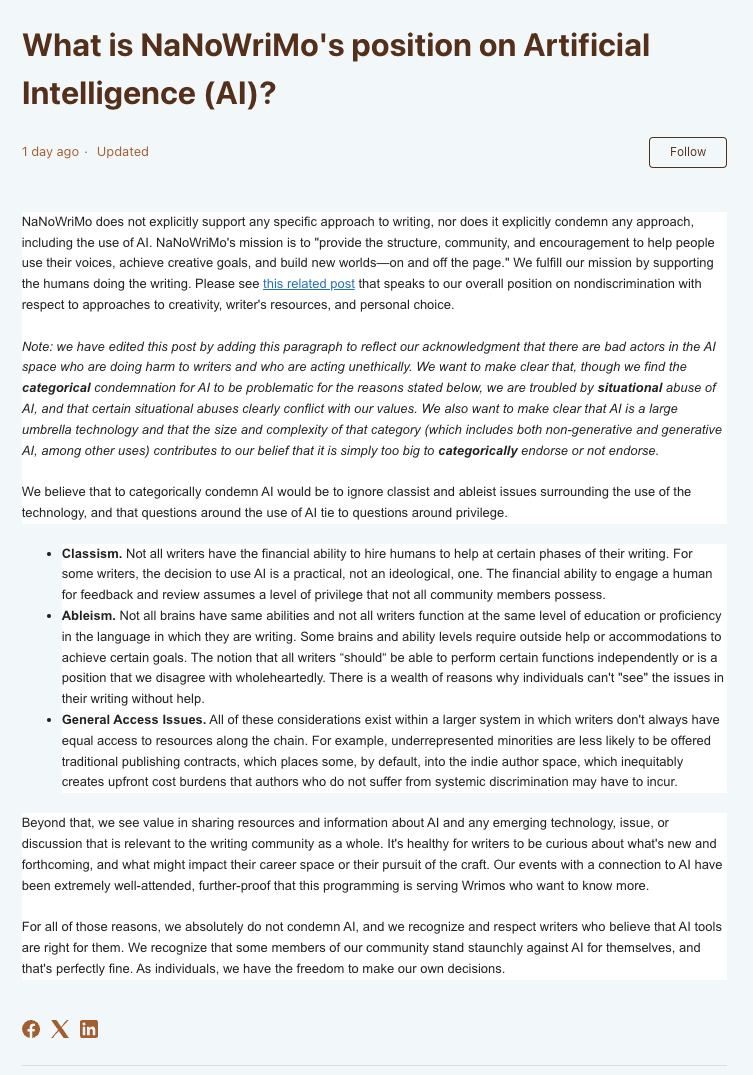
Within the past twelve hours or so at the time I'm writing this, they heavily redacted their statement, and released a follow-up letter that essentially says they know people are mad at them for their original statement, and they'll try not to make people mad in the future.
It's reasonable for people to have reacted badly; the “statement” they released was very silly. To say “we will not take one of two positions, but we will say that one of those positions is classist and ableist” is not the deft rhetorical maneuver that NaNoWriMo seems to think it is. The arguments themselves around this so-called classism and ableism wave off the actual existence of writing communities, critique groups, beta readers, and critique partners; they also ignore the creative realities of the impoverished and disabled artists, marginalized authors, and indie authors who have been working all this time without the help of language learning model software that was trained on work stolen from their peers and colleagues.
The goofiest line here is their conclusion–namely, that “as individuals, we have the freedom to make our own decisions.” This statement is so hollow it floats. It’s a classic of the genre: We respect people’s right to do and say what they want, so no, we will not be expressing or acting on actual principles at this time. It’s cowardly and worthless, and usually translates to ‘we don’t want to say things that might make people stop giving us money, so we will not say anything at all.’
Which brings us to the truth of the NaNoWriMo situation. As of the time I’m writing this, NaNoWriMo is sponsored by ProWritingAid, a writing app that advertises AI-powered technology, including text rewrites.
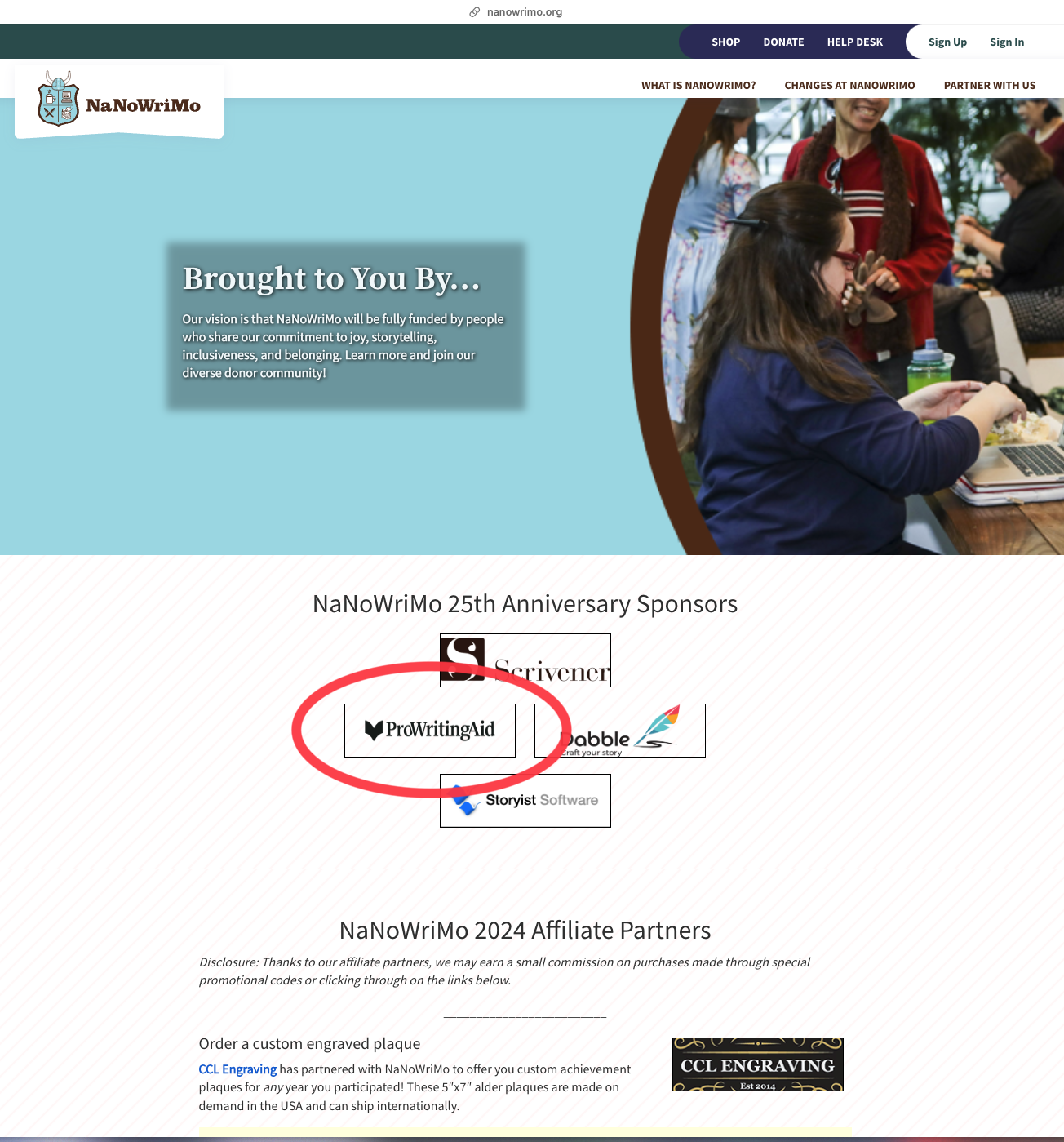
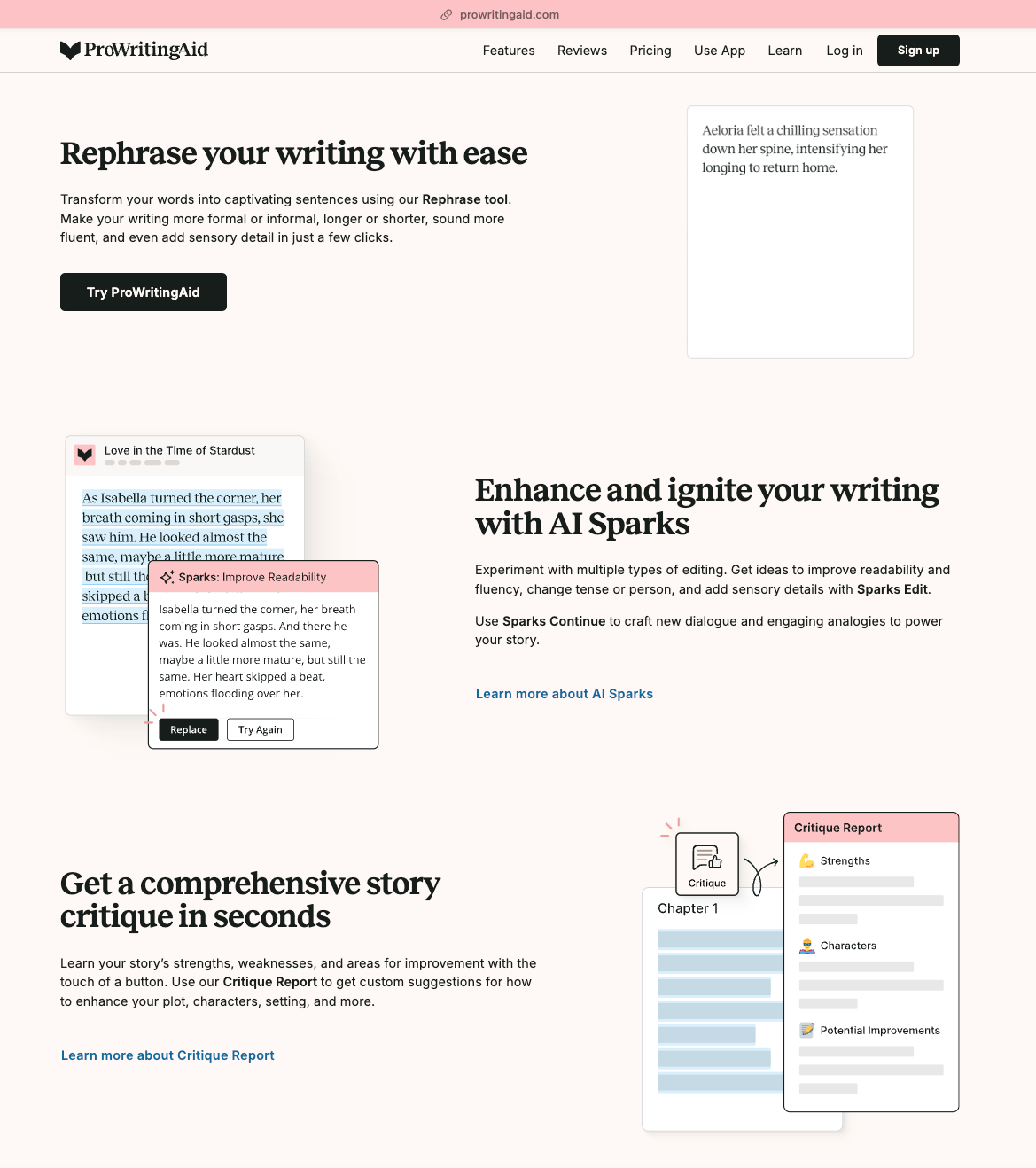
This is not about protecting marginalized authors from classism and ableism. It’s about money. In my experience, this is what’s usually happening when an organization uses the language of social justice and equal access to explain why they’re up to some bullshit. NaNoWriMo is no exception.
They want money; they do not want to lose money; they are willing to leverage your desire to be kind, caring, and nuanced in order to serve those interests.
I would care about this situation either way, but it carries a little extra weight for me, because I have been associated with NaNoWriMo for a few years now. They approached me in 2022 to ask me to write a pep talk for authors taking on the annual 50,000 word writing challenge. They later asked me if I’d like to be on their “writers board,” a role they accurately described as an extremely low-commitment position which mostly involved my name and headshot being on their website. I accepted and didn’t have further personal contact with anyone at the company until this week, when I saw the statement they released and got in touch about it.
The person I’d been communicating with about the pep talk and the writers board no longer works for NaNoWriMo, so when I learned about NaNoWriMo’s statement, I contacted them via their helpdesk – the only contact information I could find on their website. I didn’t receive a reply. I then sent an email to the defunct email address of the person who no longer worked there, in hopes that someone might still be monitoring the inbox. In both instances, I asked to please have my name and work removed from all NaNoWriMo-affiliated materials, including the website.
In the end, I was contacted by Kilby Blades, who is the Interim Executive Director of NaNoWriMo and, according to her website, the President of the Board of Directors of the same organization. (I say “according to her website” because I don’t know if she’s currently holding both positions simultaneously.) Among some courtesies, she said that NaNoWriMo had been “widely misquoted over the past 48 hours.” She also summarized NaNoWriMo’s statement for me, pointed me to a post about how delegitimizing forms of writing harms authors, and expressed sympathy for the reputation management she imagined I was doing by asking to be removed from NaNoWriMo’s materials. (Interestingly, she did not point me to NaNoWriMo’s other statement on the use of AI in writing – which was, itself, written by ChatGPT.)
Here is my full reply (text in alt).
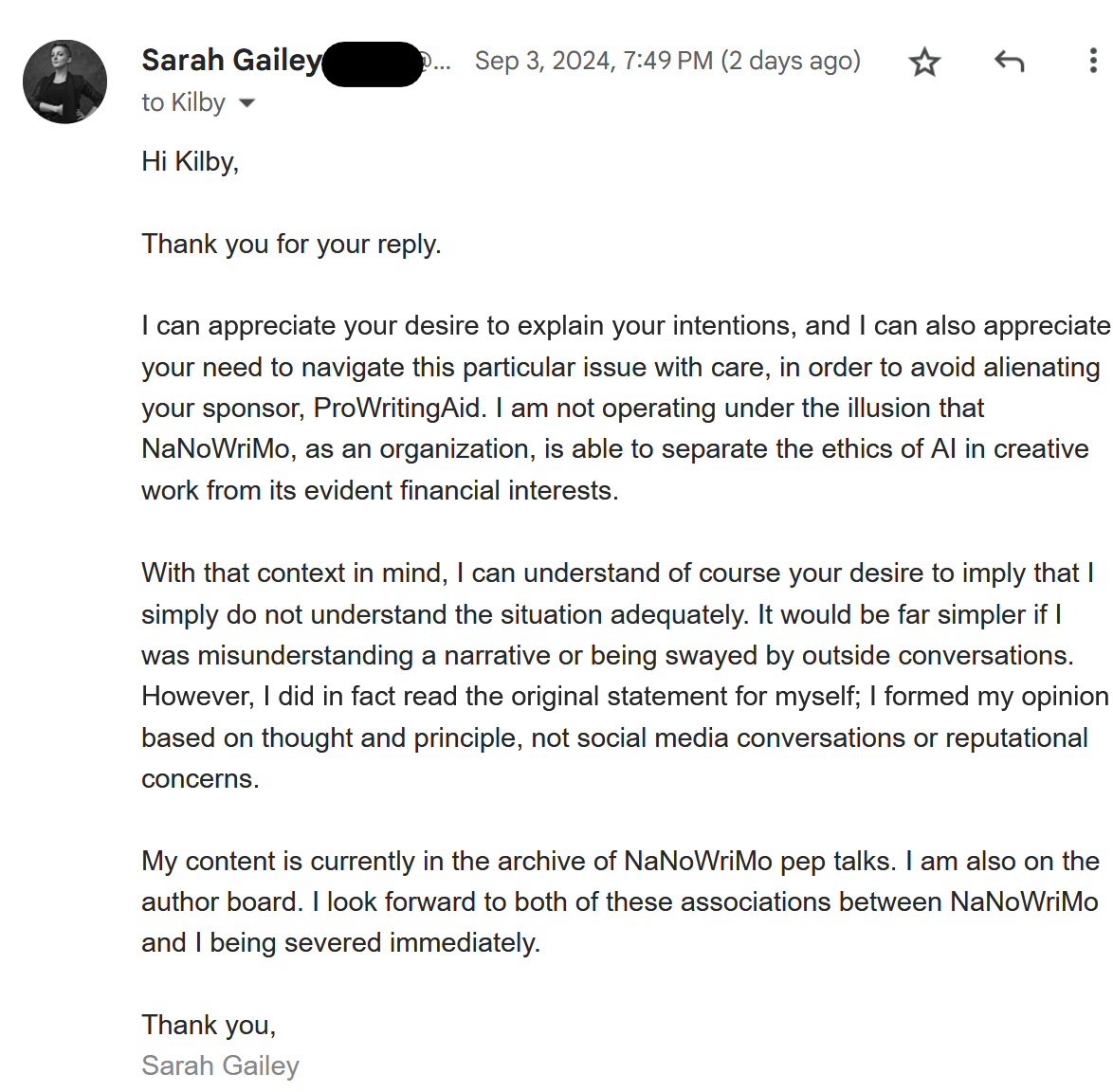
I haven’t heard anything back. As of the time I’m writing this, the urls for the staff page and the Writers’ Board page are returning 404 errors. So does the url for my pep talk.
Fortunately, I retained the copyright for that pep talk. You can read the full text below.
I wrote it myself.
-gailey
On the Difficulty of Writing
The only thing harder than writing is not writing.
Writing is hard – we must acknowledge that. Writing requires us to card the wool of the mind, to take experiences and memories and sort them into letters so other people might think, feel, understand. One must take an uncategorizable, inexplicable, throbbing knot of perception and emotion and experience and somehow render it legible to outsiders. I tasted a fig once and knew that no one else in the world, anywhere, ever, would taste the same fig as me – once I’d eaten it, there was nothing to be shared. I might write about the fig: I’d call the flavor green and sweet and crushing, I’d explain how every fig is an inside-out flower, I’d pick my way through a deep and fervent and frankly graphic description of the textures involved. But if I did that, I’d know while I was choosing those words that they could never make the reader understand precisely how the fig felt on my tongue.
Writing is impossible. The alphabet I use to write only has twenty-six letters in it. No matter how many ways I rearrange those letters, I don’t think they can possibly be enough to encapsulate the way it feels to be alive.
Maybe it’s hopeless.
But oh, god, at least it isn’t not writing.
Not writing is a hellish expanse of time spent wandering the house, staring at packed dirt in the yard, dusting the tops of doorframes and rearranging the kitchen cupboards. Not writing is a commute: a damp bench on a train platform, dreading the hot breath that will rush out of the tunnel ahead of the train, wondering if there will be a less-damp seat available once it arrives. If writing is a puzzle that can never quite be solved, then not writing is a puzzle in a box that can never be opened – what’s the point of it? It stales on the shelf.
The worst part of not writing is that writing always lingers at the edges of it. There’s a prickle on the back of my neck when I’m not writing, an unanswered-message feeling. Because the story is waiting. It’s perched in the future somewhere and it wants to be real and I am the only one preventing that from happening. And yes, I might tell that patient expectant story, writing is hard. How, I might ask, does one begin to explain the transgressive thrill of biting through the flesh of the fig?
But then again, I am the only one who ate that fig. I am the only one who can write about what it was like to eat that fig. And because I am the only one who can write that description, the joy of trying to figure out how to write it belongs only to me. It’s mine to claim, that toil, that triumph – and what do I have to do to claim it? I have to turn away from the awful clinging hours of not writing.
I can do that, so the story can become what it’s meant to be. It’s not so hard to write.
Not compared to the alternative.
Support Your Community
Go get vaccinated! You can get an updated COVID-19 vaccine, a flu shot, and a monkeypox vaccine. And you absolutely should get all three if you can. The new COVID variant is brutal; the flu is awful; monkeypox is in the continental United States and it has a 10% mortality rate and friends, it is not fun.
- Find pharmacies near you and get help scheduling appointments
- Stay up to date on the latest information from the CDC
- Educate your communities with free educational materials
For the past several months, I have been sharing links and resources with you to support our neighbors in Palestine, who have been suffering a brutal and sustained attack by the government of Israel. In addition to the ongoing genocide in Gaza, violence is mounting in the West Bank. We have the power to help the people who need us right now. Here are a few ways you can do your part, and a few ways to help that remain evergreen.
- Support the United Nations relief efforts in Palestine here
- Donate to the Palestine Children’s Relief Fund (PCRF) here
- Purchase from Palestinian-owned business – here’s 15 Palestinian brands, 8 Palestinian Etsy Shops, and a portal full of Palestinian goods
- 6 ways you can support Palestinians in Gaza
- Gaza Funds, a website that gathers crowdfunding campaigns from people in need in Gaza
- Check out Operation Olive Branch, which helps fund medical evacuations
- Connect with Jewish Voice for Peace
- Use Resistbot to contact your representatives
Finally! You may be aware that in November, the United States will hold an election. If you are eligible to vote in this election, it’s absolutely vital that you confirm your voter registration status. Voter rolls are being purged and tampered with on a regular basis throughout the United States - 1.1 million voters have been purged in Texas alone - so being previously registered to vote is not a guarantee of your current status.
- Click here to learn your current voter registration status
- Click here to register to vote in your state
Alasdair Stuart Reviews: Duck Detective: The Secret Salami
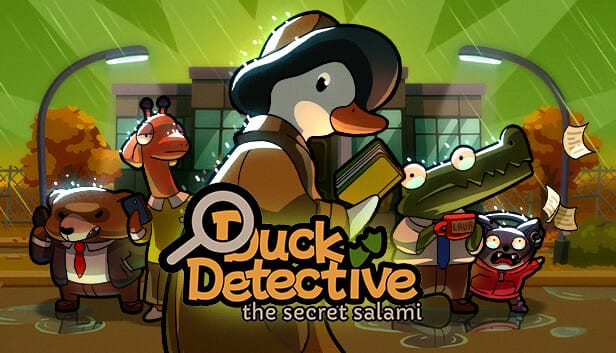
The incredibly insightful Alasdair Stuart is a pop culture genius, reviewer extraordinaire, and regular Digest contributor. Be sure to subscribe to The Full Lid for more brilliant pop culture analysis.
I will walk a thousand miles for a good dad joke, and I will walk a thousand more to enthusiastically write about games full of them. You should play Duck Detective. Not just for the dad jokes, and we’ll get to them, but because inside the first ten minutes of Duck Detective: The Secret Salami, we discover that our hero is a recovering bread addict and his name is Eugene McQuacklin.
MCQUACKLIN
COME ON
Hired by a mysterious client at the local bus company, Eugene sets off to discover who hired him, why, and just what the deal is with the salami in Freddy Frederson's bag. Freddy is super enthusiastic, super incompetent and has the exact social skills you’d expect from a crocodile working an office job, But here’s the thing…he’s innocent. So what’s with the salami? Who’s the lunch thief? What’s really going on at the bus company?
Eugene waddles adorably around the locations and the game is set up to reward players who will leave no stone unturned and no crumb unexamined. A cute mechanic involving a magnifying glass helps you find words, and those words can then be slotted into Eugene's notes. If you've got the right word, it turns green. Get every word right and you've cracked the case. It's a fun mechanic, if one occasionally prone to being brute forced, and it puts you inside the feathered head of the titular sleuth in a surprisingly involving way.
It helps a lot that the script is so good too, and for a game that you'll finish in three hours, there's a lot going on here. The noir tone is perfect and melds surprisingly well with the occasional anime style joke. The gorgeous soundtrack by Svyatoslav Petrov helps too, shifting between Nintendo perky and the sort of note perfect 2 am jazz that no one expects in a game about a crime fighting duck.
The voice acting is top notch as well and Sean Chiplok's exhausted avian crimefighter is incredibly likable. Lizzie Freeman as customer service rep Laura Angst (yes), and Brian David Gilbert as the hapless Freddy are also standouts but the entire team get the joke and that means you do too.
Down these mean streets a lonely duck must waddle, who is not himself mean. The Duck Detective is short, smart, fun and plucky. Exactly like the Duck Detective himself. It's available now separately (As is the soundtrack!) as well as in a bundle with the Darkside Detective games. The bundle is of course called The Duckside Detective. Get it if you can, all three games are wonderful.
Currently Reading: The Night Mother by Jeremy Lambert, Alexa Sharpe, and Becca Carey
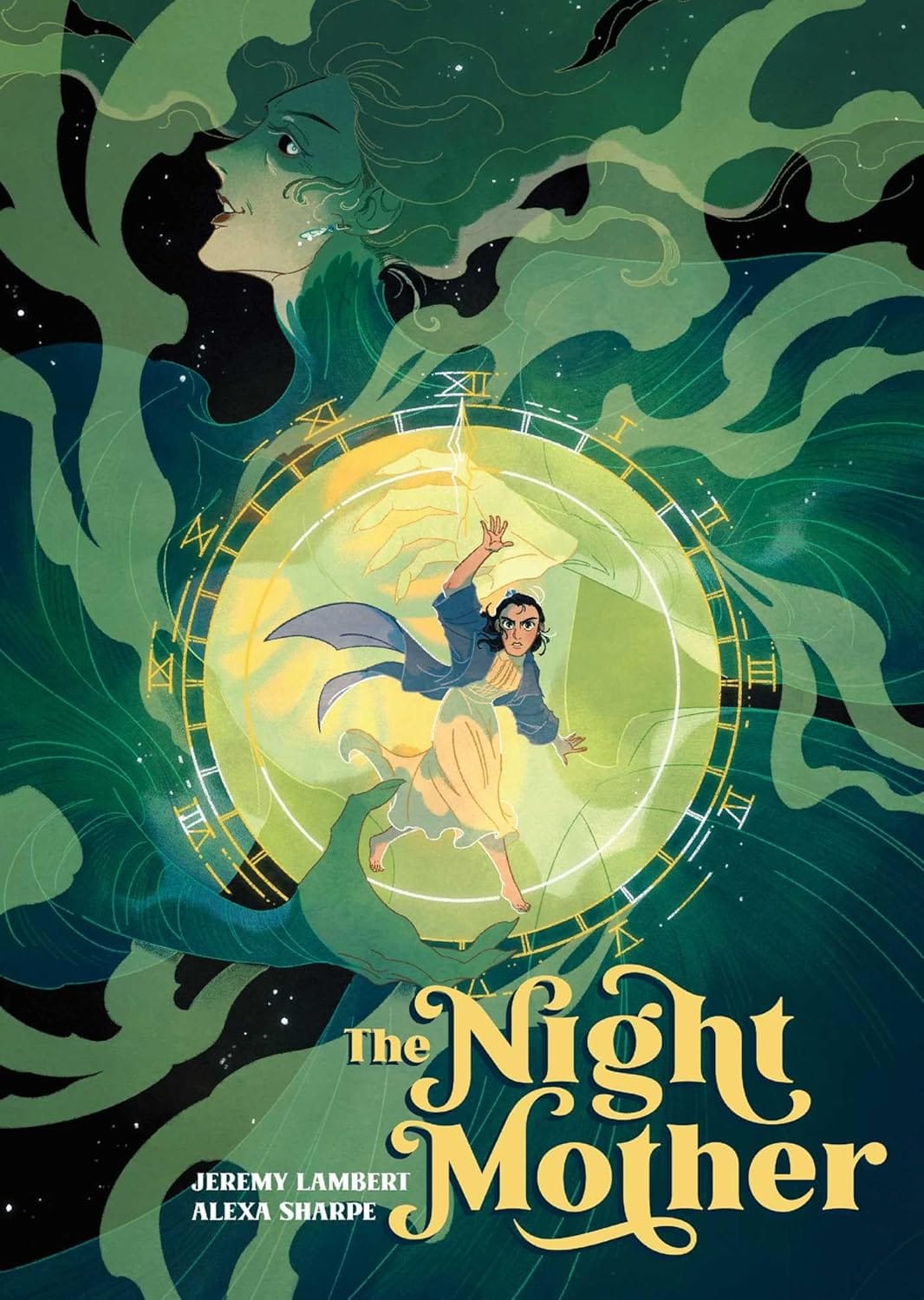
The moon is stuck like a broken clock in the midnight sky, the sun a distant memory. No one in this quiet seaside town can remember how long this unnatural darkness has lasted. No one, that is, except for the curious girl who lives in the graveyard, caring for the dead: twelve-year-old Madeline Tock. In gratitude, the departed whisper their worries to her, sounding just like her overprotective but loving father: beware this endless night and she who causes it.
Because there’s someone else who can hear the whispers, too . . . someone whose gown is a map of the cosmos, hair a tangled constellation, eyes like the lights of faraway stars. The Night Mother. Her elemental duty is to gather the souls of the dead in her lantern, then send them to their eternal rest as beautiful moonlight. But when her hunger for power drives her to take souls from the living, Madeline bravely stands up to defend her town and those she loves. Can Madeline help bring back the sun, or will she be lured by the starry promises of this mysterious woman?
Barnes & Noble | Bad River Website | Local Library | Find an Indie Bookstore
Featured New Release: Haunt Sweet Home by Sarah Pinsker
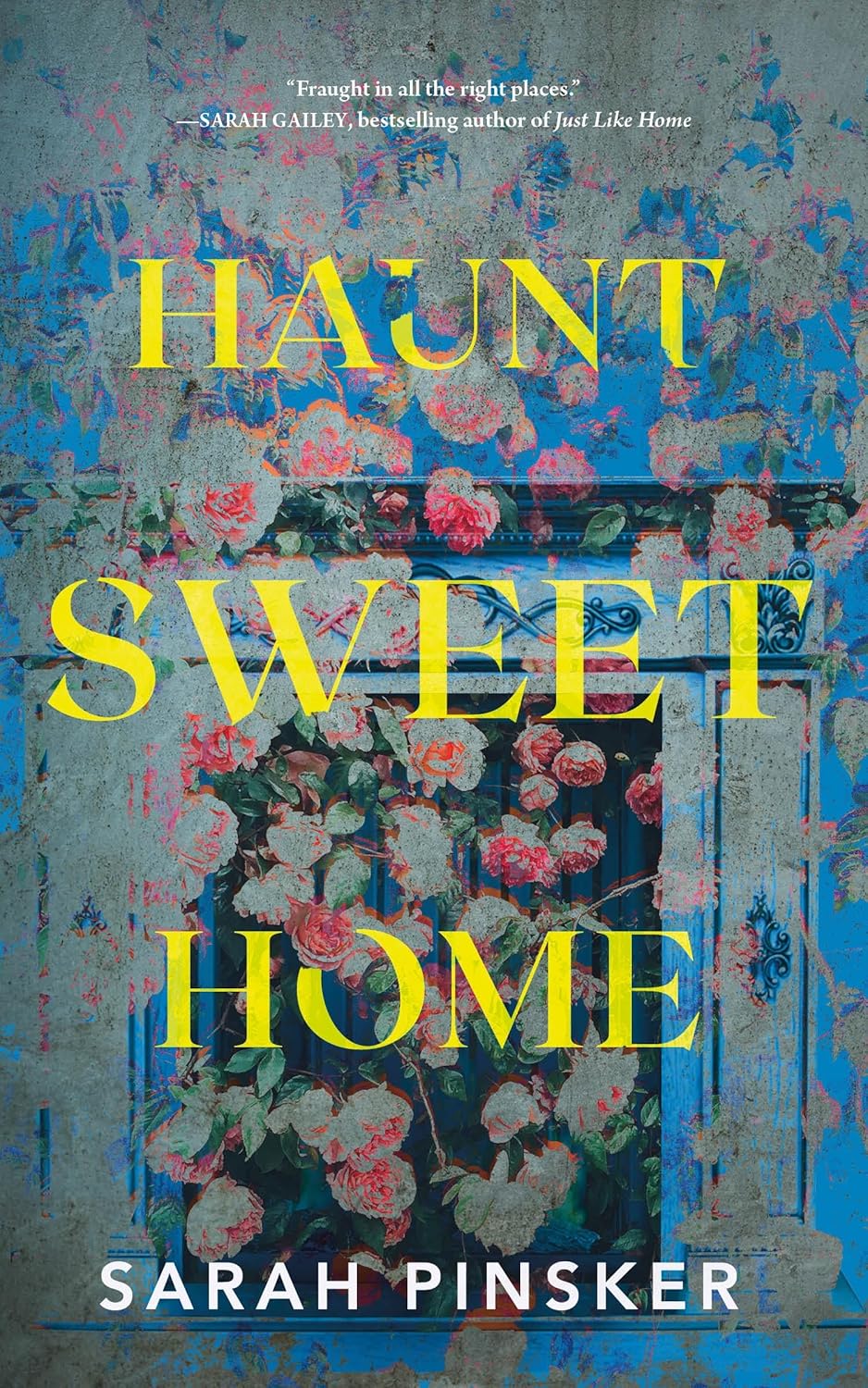
“Don’t talk to day about what we do at night.”
When aimless twenty-something Mara lands a job as the night-shift production assistant on her cousin’s ghost hunting/home makeover reality TV show Haunt Sweet Home, she quickly determines her new role will require a healthy attitude toward duplicity. But as she hides fog machines in the woods and improvises scares to spook new homeowners, a series of unnerving incidents on set and a creepy new coworker force Mara to confront whether the person she's truly been deceiving and hiding from all along—is herself.
Barnes & Noble | Bad River Website | Local Library | Find an Indie Bookstore
If you’re a paying subscriber, this month’s Supper Club post will be in your inbox soon, with a special surprise gift from Gailey! If you’re not in the Supper Club yet, sign up now to get in on something fun that’s coming to subscribers in September.
—Gailey

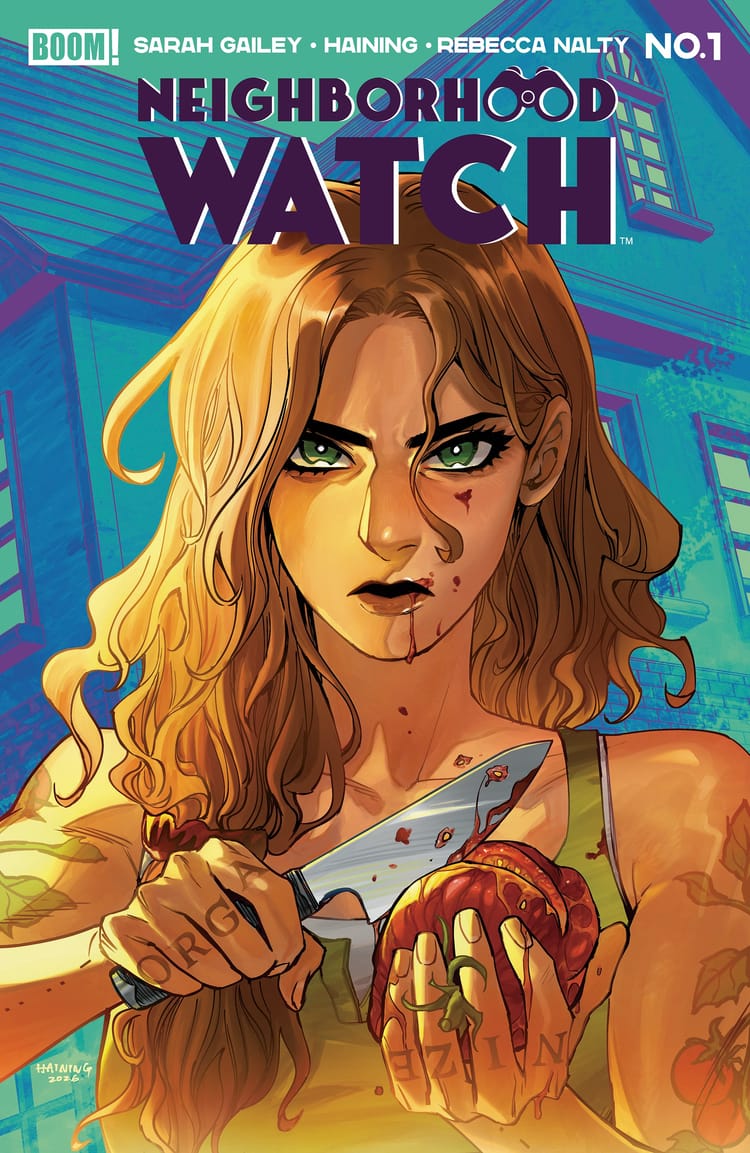




Member discussion